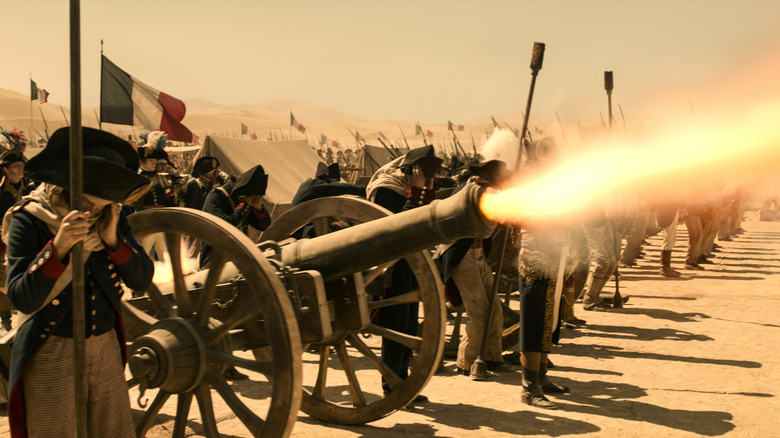The Real Reason Napoleon Disobeyed Orders And Left Egypt To Return To France
Contains spoilers for "Napoleon"
In Ridley Scott's "Napoleon," the titular character (Joaquin Phoenix) is shown leading armies in Egypt for an extended sequence of the film. He apocryphally shoots at some pyramids and irreverently opens the caskets of a pharaoh to size himself up (literally) to the competition. Eventually, the story moves on when Napoleon finds out that his new wife, Josephine (Vanessa Kirby), is having an affair back in France. Oh yeah, and it's the talk of the town. In response, the embarrassed tyrant-on-the-rise takes a small squadron of just a few ships, abandons his post, and returns home to fix things. Except, that's not at all what happened, historically speaking.
In reality, Napoleon Bonaparte returned to mainland Europe in order to save France from a crisis and consolidate power. When he initially arrived in northern Egypt in 1798, the French general swept every challenge before him. However, in the wake of these early successes, the French navy lost to the British, leaving Napoleon's armies stranded in his sandy new conquest. Over the next year, he established stability in French-ruled Egypt and unsuccessfully invaded Syria before beating a hasty retreat back to the Land of the Nile.
At that point, France's international enemies were gaining new momentum. News arrived of defeats in other areas of the fledgling republic's growing empire, sparking riots and disturbances in France. In light of the news, Napoleon decided to leave his army and head back home. He had multiple motivations for this move, but Josephine was likely not one of them. Instead, Napoleon came back to save France ... with the additional goal of gaining more power.
The Napoleonic era nearly died in its infancy
After invading Egypt as a way to threaten Great Britain's far-flung sources of global wealth, Napoleon Bonaparte found himself cut off from home when the British defeated the French at sea. This is a bigger deal than it sounds. The naval engagement — called the Battle of the Nile — is one of famed British admiral Lord Horatio Nelson's first major victories over the French. It was a crushing blow, and it left the Brits (who already had formidable sea power) in uncontested control of the water.
When Napoleon decided to head back home to consolidate power, he actually ran a tremendous risk. But while the movie version is accurate in depicting the leader opting to board a couple of ships to quietly sail off to France, what the film doesn't explain is that this was done with the utmost secrecy in order to avoid being intercepted by British warships.
Amazingly, Napoleon didn't get caught and was able to continue to chase his destiny as a warmongering tyrant on the mainland. This is a wild coincidence, as his micro-squadron of just a handful of ships basically had to avoid being spotted by an entire navy of roving British war vessels. It is a remarkable stroke of fortune that Napoleon survived this journey across the Mediterranean Sea, which poses a wild question: what if he didn't? If the future emperor were captured or killed at sea in 1799, would he ever have risen to his future heights? Would battles like Austerlitz or Waterloo have taken place? Would nearly half a million men have perished in the invasion of Russia? It's a fascinating "what if."
Certain elements of Scott's version of the story are correct
While Napoleon Bonaparte's motivation for leaving Egypt wasn't quite as shallow as the adaptation depicts, that doesn't mean those details were created out of whole cloth. On the contrary, there are several historical nuggets that still made it through to the final script, and Napoleon's wish to discreetly sneak through on a small squadron is one such element that remains intact.
Josephine's ill-advised behavior is another. While the specifics are hazy, Encylopedia Britannica's entry on Josephine summarizes her indiscretions by saying that she was an indifferent wife who neglected Napoleon's affections, adding that she is also on record for seriously flirting with an army officer while her husband was away. While the flirtatious behavior is there, though, it is hardly presented as the reason Napoleon rushed off, abandoning his post and risking death or imprisonment in the process.
The other interesting part is that, while Napoleon was technically ordered to return to France by his superiors at the time, he left Egypt before getting the order. So, his disregard for military responsibilities reflected in the film is also on point. As is usually the case with Ridley Scott's historical films, the director is remarkably faithful to the historical narrative until it doesn't fit his story, at which point he bends the details a bit to make sure everything flows together. It isn't a criticism so much as an observation of the necessities that come with adapting historical narratives to the silver screen — not that Mr. Scott cares anyway.


